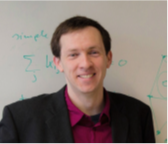Thursday, July 7, 2022 | 02:00 pm (CET) | Room: B4.1.114, Lakeside Park B04b, level 1
Professor Dr. rer. nat. Marc Timme | Strategic Professor & Chair for Network Dynamics TU Dresden, Germany
Abstract: The dynamics of networks enables the function of a variety of systems we rely on every day, from gene regulation and metabolism in the cell to the distribution of electric power and communication of information. Understanding, steering and predicting the function of interacting nonlinear dynamical systems, in particular if they are externally driven out of equilibrium, relies on obtaining and evaluating suitable models, posing at least two major challenges. First, how can we extract key structural system features of networks if only time series data provide information about the dynamics of (some) units? Second, how can we characterize nonlinear responses of nonlinear multi-dimensional systems externally driven by fluctuations, and consequently, predict tipping points at which normal operational states may be lost? Here we report recent progress on nonlinear response theory extended to predict tipping points and on model-free inference of network structural features from observed dynamics.
This is work with Jose Casadiego, Mor Nitzan, Hauke Haehne, Georg Boerner, Moritz Thuemler and others.
[1] Topical Review: Marc Timme & Jose Casadiego, J. Phys. A 47:343001 (2014).
[2] Casadiego et al., Nature Comm. 8:2192 (2017).
[3] Nitzan et al., Science Adv.:e1600396 (2017).
[4] Haehne et al., Phys. Rev. Lett. 122:158301 (2019).
[5] Moritz Thuemler et al., submitted (2022).
Bio: Marc Timme studied Physics and Mathematics in Würzburg, Stony Brook (USA) and Göttingen. After work as a postdoctoral research at the Max Planck Institute for Flow Research and as a Research Scholar at Cornell University (USA), he was selected to head a broadly cross-disciplinary Max Planck Research Group on Network Dynamics at the Max Planck Institute for Dynamics and Self-Organization. Marc held a Visiting Professorship at TU Darmstadt and was visiting faculty at ETH Zurich. He is now Strategic Professor and heads the Chair for Network Dynamics at the Cluster of Excellence Center for Advancing Electronics Dresden (cfaed) and the Institute for Theoretical Physics at TU Dresden. He is also Co-Chair of the Division of Socio-Economic Physics of the German Physical Society (DPG) and since 2018 Honorary Member of Lakeside Labs, Klagenfurt.
With collaborator teams he develops insights about collective nonlinear dynamics of complex systems and their applications in fields of energy and sustainability, mobility, as well as biological and bio-inspired information processing.

